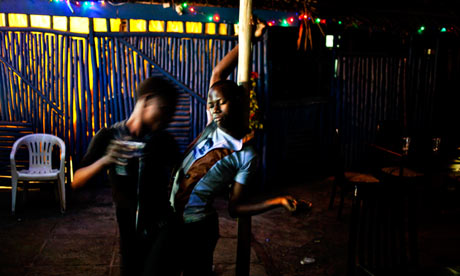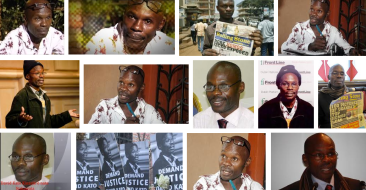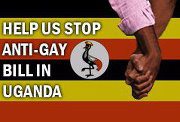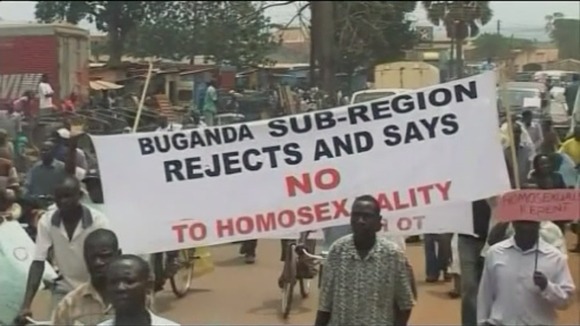Kill the Gays Bill' revived in Uganda, with some changes. Many fear damage is done, think law is passed
Bill would criminalize and condemn homosexuals to life in prison.
Homosexuals in Uganda are worried again after a bill that would criminalize and severely punish homosexual activity was revived in Parliament. The Anti-Homosexuality Bill is notoriously known as the "kill the gays bill" because of its previous inclusion of the death penalty.
KAMPALA, UGANDA (Catholic Online) - The bill had
been tabled for some time, after international condemnation, but it was
revived late last year as a "Christmas present" from the Speaker of the
Parliament, Rebecca Kadaga.
Ugandans who self-identify as gays are now fearing for their lives once again, and facing more threats and discrimination than ever before.
David Bahati, a Member of Parliament, proposed the The Anti-Homosexuality Bill in 2009. The bill contained language which mandated the death penalty for anyone who engaged in intercourse with same-sex persons, disabled persons, or children. The bill also made a point of affording HIV positive convicts who engaged in same-sex activity the death penalty too.
Life sentences were mandated for anyone who simply touched another person with the intent of "committing an act of homosexuality."
The bill was popular in the conservative African nation, but condemned around the world. Several countries, including the United States, vowed to cut aid funding if the bill was passed.
Challenges from human rights groups also helped push the law back to the shelf to die.
Following developments including the murder of a prominent homosexual activist, the bill was allowed to expire in May, 2011.
However, Speaker Kadaga revived the bill last November, saying the country's culture has "no room for gays."
The bill has been softened, but only a bit. The death penalty has been removed, now affording a few years in prison to life sentences for those duly convicted.
Same sex intercourse will result in a life sentence.
The bill is set for debate before the Parliament soon.
Homosexual activists are speaking out against the bill, which they say is cruel and harsh. Activists and others who identify as having same-sex attraction say they are fearful, even to speak out because they often receive threats. Even if the bill does not pass, there is concern that its mere discussion in government will somehow legitimize vigilante attacks against homosexuals.
Already some Ugandans say they believe the bill is already law and have acted accordingly, accusing people they think are homosexual and even attacking them.
If not for the Western world exercising extreme pressure on the Ugandan government, the bill would almost certainly pass. However, Uganda is dependent on the West for some 25 percent of its annual budget.
Homosexual activists vow to challenge the bill in court if it becomes law, however they fear that much of the damage will have already been done, even if the law is defeated.
Tragically, while the sin of homosexual behavior is just that, sinful, Uganda's sharp reaction to it is also out of step with the modern era and Church teaching. Today, theologians and moral philosophers, along with nearly all legal scholars condemn the notion of a death penalty for most acts of sexual deviance, particularly between consenting adults.
In the modern era, homosexuality is seen as a mental health question, although its status as a mental issue is still hotly debated.
It is unknown if Uganda will pass the bill, however if Western opposition remains strong, which it probably will, then those wishing to address the issue of homosexuality in Ugandan society would be better served taking an alternative, and possibly more Christian approach to the issue.
© 2013, Distributed by NEWS CONSORTIUM.
Ugandans who self-identify as gays are now fearing for their lives once again, and facing more threats and discrimination than ever before.
David Bahati, a Member of Parliament, proposed the The Anti-Homosexuality Bill in 2009. The bill contained language which mandated the death penalty for anyone who engaged in intercourse with same-sex persons, disabled persons, or children. The bill also made a point of affording HIV positive convicts who engaged in same-sex activity the death penalty too.
Life sentences were mandated for anyone who simply touched another person with the intent of "committing an act of homosexuality."
The bill was popular in the conservative African nation, but condemned around the world. Several countries, including the United States, vowed to cut aid funding if the bill was passed.
Challenges from human rights groups also helped push the law back to the shelf to die.
Following developments including the murder of a prominent homosexual activist, the bill was allowed to expire in May, 2011.
However, Speaker Kadaga revived the bill last November, saying the country's culture has "no room for gays."
The bill has been softened, but only a bit. The death penalty has been removed, now affording a few years in prison to life sentences for those duly convicted.
Same sex intercourse will result in a life sentence.
The bill is set for debate before the Parliament soon.
Homosexual activists are speaking out against the bill, which they say is cruel and harsh. Activists and others who identify as having same-sex attraction say they are fearful, even to speak out because they often receive threats. Even if the bill does not pass, there is concern that its mere discussion in government will somehow legitimize vigilante attacks against homosexuals.
Already some Ugandans say they believe the bill is already law and have acted accordingly, accusing people they think are homosexual and even attacking them.
If not for the Western world exercising extreme pressure on the Ugandan government, the bill would almost certainly pass. However, Uganda is dependent on the West for some 25 percent of its annual budget.
Homosexual activists vow to challenge the bill in court if it becomes law, however they fear that much of the damage will have already been done, even if the law is defeated.
Tragically, while the sin of homosexual behavior is just that, sinful, Uganda's sharp reaction to it is also out of step with the modern era and Church teaching. Today, theologians and moral philosophers, along with nearly all legal scholars condemn the notion of a death penalty for most acts of sexual deviance, particularly between consenting adults.
In the modern era, homosexuality is seen as a mental health question, although its status as a mental issue is still hotly debated.
It is unknown if Uganda will pass the bill, however if Western opposition remains strong, which it probably will, then those wishing to address the issue of homosexuality in Ugandan society would be better served taking an alternative, and possibly more Christian approach to the issue.
© 2013, Distributed by NEWS CONSORTIUM.

 David Kato was born to the Kisule clan in its ancestral village of Nakawala, Namataba, Mukono District, in Uganda. The younger of twins, he was educated at King’s College Budo and Kyambogo University and taught at various schools including the Nile Vocational Institute in Njeru, where he became aware of his sexual orientation and was subsequently dismissed without any benefits in 1991.
David Kato was born to the Kisule clan in its ancestral village of Nakawala, Namataba, Mukono District, in Uganda. The younger of twins, he was educated at King’s College Budo and Kyambogo University and taught at various schools including the Nile Vocational Institute in Njeru, where he became aware of his sexual orientation and was subsequently dismissed without any benefits in 1991.
